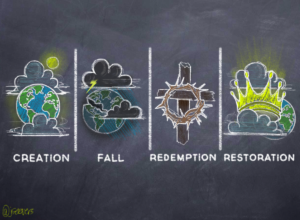What Will You Find Here?
At The Whole Christian Life, we are dedicated to a clear proclamation of the Gospel, Biblical teaching that edifies the Church, and a consistent moral witness that honors Christ through our actions as well as our words and thoughts. In pursuing this, we produce short educational videos, longer format podcasts, articles, and other informative media. Please explore our resources with the help of the menu and search bar.

A Quick Word from Brandon
“Hello! My name is Brandon Andrews and I am the founder of The Whole Christian Life ministry. I started this website and ministry as a project where I can leverage my years of seminary training, thoughtful reflection, and heart for the Gospel, toward the end of glorifying Jesus. I, like everyone, have many questions about the Christian life that cover a wide range of topics; some practical, some impractical. I promise there isn’t a question or topic that I’m not willing to consider or discuss, however random it seems. Please send me your questions through the Contact Us portal, or directly email us at questions@thewholechristianlife.org. I provide a little more detail about my testimony and background on the About Us page. Thanks for stopping by. I pray it has been beneficial for you.”

“Have you ever thought about…?”

Has one of our videos sparked a question or personal investigation into a topic that you would like us to discuss or explore in another video? Please send us your request through the “Questions” link below.
Our Media and Resources

Topical Videos
Shorter-edited videos in which we explore a specific topic, current issue, Biblical concept, or passage of Scripture.

Podcasts and Interviews
Where you can find podcasts in which Brandon interviews friends, family, and guests. A variety of topics are covered.

Articles
Similar to the Topical Videos, only in print form.

The Blog
Where you can find The Whole Christian Life blog.
What is the Gospel?
“Now I want to make clear for you, brothers and sisters, the gospel I preached to you, which you received, on which you have taken your stand and by which you are being saved, if you hold to the message I preached to you—unless you believed in vain. For I passed on to you as most important what I also received: that Christ died for our sins according to the Scriptures, that he was buried, that he was raised on the third day according to the Scriptures,” – 1 Cor. 15:1-4
As the Apostle Paul explains in this letter to the church in Corinth, the Gospel is both a message and a work of salvation. The particular ancient Greek word – euangelion – translated as gospel has the explicit meaning of “good news.” Thus, the author of The Gospel According to Mark writes in the opening passage, “The beginning of the good news about Jesus the Messiah” (1:1, NIV). The Gospel is a message of salvation, the subject of whom is Jesus, the Son of God, the Messiah. But what is it that Jesus did or said that makes this message about Him such good news? As Paul explains in 1 Cor. 15, Jesus died on the cross for our sins and then was raised from the dead. Through Jesus’ death on the cross for sins, and His resurrection from the dead, the follower of Christ has a sure hope of salvation.


*You can find various similar versions of the above graphic online. I can’t remember now where I retrieved this image or who was the original illustrator.
What does it mean that Jesus died on the cross for our sin? And why was this necessary? And how can we be certain that Jesus actually rose from the dead?
To answer those questions more in depth I would like you to follow the link below. Here is a brief explanation, though. God originally created humans to have perfect fellowship with Him and to glorify Him. Humans, though, disobeyed God’s good law, and as a result, bear the guilt of sin. The consequence of this sin is spiritual alienation from God and physical death (Rom. 6:23). Jesus’ death on the cross pays the debt of sin because Jesus, Himself, was without sin (2 Cor. 5:21) . In repenting of your sin and trusting in Jesus, you can receive Jesus’ righteousness and have the hope of resurrection in the same way that Jesus was raised from the dead (Rom. 10:9-10, 1 Cor. 15:20-22). I call you now to seriously consider this message and ask yourself whether it is true. If you would like a further explanation of the Gospel, click on the “Read More” button below. If you are ready to repent of your sin and trust in Jesus, then I encourage you to click on the “Trust in Jesus” button. That link will give you some details about what the next steps in becoming a follower of Jesus looks like.
Before you move on from this section, I would like to share with you one last point about the Gospel. The Gospel is a demonstration of God’s love for His children. Jesus says in John 15:13 that there is no greater expression of love than for someone to lay down their life for another person. It is not uncommon to find someone who will sacrifice their life to save the person they love. Paul reminds us though, that when Jesus sacrificed His life for us, we were sinners, enemies of God, whether we saw ourselves that way or not (Rom. 5:8, Eph. 2:1-5).
The offer of the Gospel goes out to all people. God does not wish that any should perish, but that everyone would repent of their sin and be saved (2 Pe. 3:9). As perhaps the most popular memory verse of all time reminds us, “For God so loved the world, that He gave His only begotten Son, that whosoever should believe in Him shall not perish, but have everlasting life.” (John 3:16)

